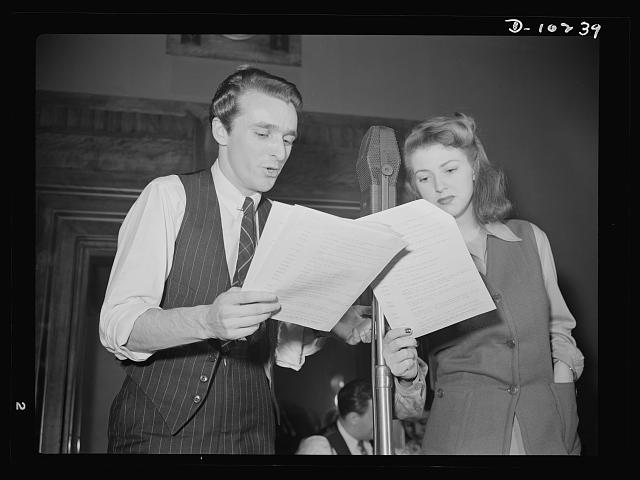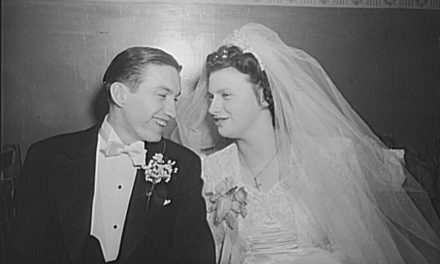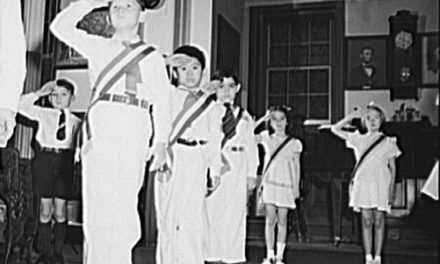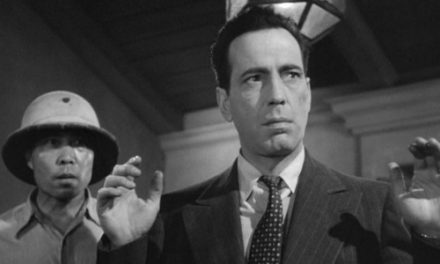To most Americans the radio is a source of entertainment, bringing joy to those who listen to it even in times of war when the reality of life is much more bleak than radio sitcoms would lead one to believe.
While listeners tune into radio shows to escape into a world of comedy and entertainment, they may not know that the Office of War Information wants them to listen to these radio sitcoms—and for good reason.
One popular program, Fibber McGee and Molly, follows the lives of a working-class couple in the fictional community of Wishful Vista. With elements of slapstick comedy as well as numerous running jokes, the most famous about a closet door, Fibber McGee has become a sensational hit with audiences across the country.
The real-life Fibber and Molly are Jim and Marian Jordan, natives of Peoria, Illinois, who are no strangers to trying to live normally through a war. The couple married on August 31, 1918, just five days before Jim received his draft notice and left to fight overseas in the first World War. Marian is a firm believer in the concept that marriages during wartime increase morale for soldiers: “[Although] I am opposed to sudden war marriages, I do think that if people have known each other and been sweethearts before the war it is good for any soldier to know that the girl he loves belongs to him. Any one of Uncle Sam’s boys will fight harder for the wife he left behind than for anyone else.”
Following his time in the war, Jim returned to his wife and the couple began performing vaudeville acts in the Chicago area, eventually gaining popularity and trying their hand at their own radio show. Their show gained popularity around 1940 and has since become one of the highest rated in the country.
Fibber McGee and Molly’s success has captured the attention of the Office of War Information (OWI). The OWI’s Domestic Radio Bureau (DRB) sends fact sheets to all of the biggest radio shows that air in U.S., relying on the entertainment that American citizens turn to for help in informing the public about important wartime measures.
The OWI’s fact sheets present the what, why and when of nationwide efforts such as gas rationing and it is up to the writers of shows like Fibber to incorporate this information into their weekly programming. The shows and its characters turn the topic of rationing gas into a funny story about Fibber becoming a “patriotic advocate of rubber” and gas conservation.
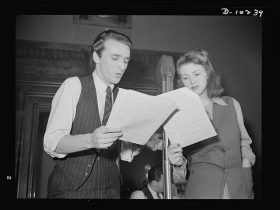
John Flynn and Virginia Moore practice for the radio show “You Can’t Do Business With Hitler.” Photo by Howard Liberman, from Library of Congress.
From its inception, the Domestic Radio Bureau has been making efforts to keep Americans abreast of all relevant information about the war without overwhelming them. The director of the DRB, William Lewis, explained that “many commercials and news programs were capitalizing on the war in a manner that exceeded all bounds of reason or good taste. The stations were scheduling information about too many subjects on any given day – far more than the public could possibly absorb.”
Lewis worked with the rest of the OWI to determine which information needs were paramount and deserve priority across networks. This method has led to the radio model that most Americans are familiar with, where official war announcements are made only once every four weeks on weekly radio programs and twice a week on programs that air more frequently.
The Special Assignment Plan was introduced by the DRB to help plan different educational material such as the Fibber McGee gas rationing skit. The aim of Lewis and other members of the Domestic Radio Bureau is to inform the public of important information and war efforts while also providing a safe space where they are able to be entertained. This and many other initiatives have been made by the Office of War Information to utilize radio for the benefit of the country.
One such initiative of the OWI is the continued effort to control advertisements on the radio. As most listeners have probably noticed, sponsors of their favorite radio shows have become more related to the war. The ad spots that play on the radio are all controlled by the OWI for the time being as an effort to promote products and services that benefit the U.S. war effort. Fibber McGee and Molly’s main sponsor, Johnson’s Wax Polishes, provides one such example. The ads are focused mainly on the use of Johnson’s waxes in the war, making sure that the public is aware that supporting the program’s sponsor means supporting the U.S. in the war.
The efforts made by the government to update radio shows such as Fibber McGee have been widely accepted by most Americans and are making the positive impact that the OWI hoped for.
As a veteran of the last major war U.S. forces fought, Jim Jordan is happy to use his influence as the character Fibber McGee to help the military in any way he can. He sees his character’s changing attitudes about U.S. policies as another way he can serve his country even though he is no longer a soldier.
In an interview with entertainment columnist Louella Parsons, Jim Jordan explained that all Americans can do their part for the war: Uncle Sam’s soldiers will be utilized wherever they fit.”
Sources:
- “Fibber McGee and Molly’s Sponsor Knows There’s a War Going On” Life advertisement, June 29, 1942, p. 4.
- Hutchens, John K. “The Funny Fellows” New York Times, October 11, 1942, p. 10.
- Morris Washington, John D. “The OWI On the Domestic Radio Front” New York Times, January 31, 1943, p. 9.
- “Radio Favorites Interviewed by Louella O. Parsons” The Washington Post, October 18, 1942, p. 12.

